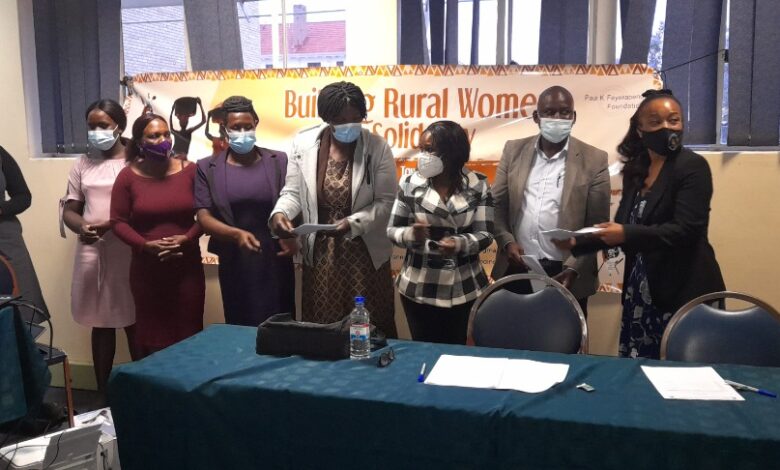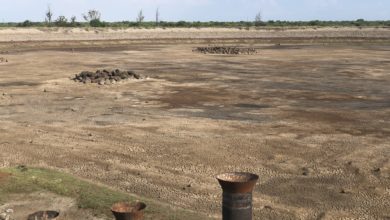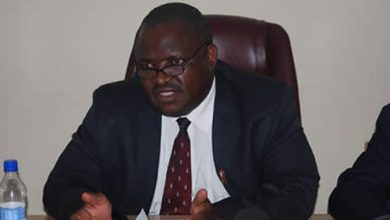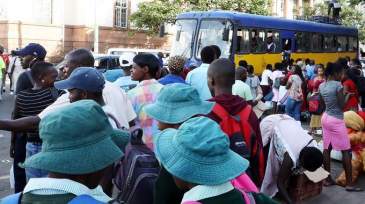Prioritise human rights when executing development-based evictions, Govt told

Rural women have implored the government to fully develop areas before relocating them when executing development-based evictions.
Representatives from communities affected by evictions made these remarks yesterday during a roundtable stakeholders meeting held in Bulawayo, Monday.
The meeting, which comes a few days after the commemoration of International Day of Rural Women, was hosted by Matabeleland Institute for Human Rights (MIHR) and the aim was to discuss the impact of development-induced evictions and displacements on the rights of rural women.
The women from affected communities accused the government of bypassing the consultation stage and only informing them when they are ordered to relocate.
They said they are relocated to areas without adequate resources especially water, mobile network infrastructure, schools and many a time the areas are semi-arid exposing them to hunger and poverty.
Thembelihle Dlamini from Dinde, in Hwange, said Chinese miners came to their area to extract coal hence the need for them to move.
She implored the government to avail grants for the affected communities such that when they are moved they may be able to start businesses in the new areas and continue fending for their families.
“May the government avail grants for those they would have moved. We need to build new homes at the resettlement areas and we need to continue with our businesses. Such displacements affect all this so we need to be catered for,” she said.
Coordinator for Youth invest in Victoria Falls, Maria Moyo said they were asked to move from their areas to make way for the Gushungo company.
She said there is no guarantee that the places where they are moving to will have resources they need on a day to day basis.
“Where we are now we have schools and clinics, but there is no guarantee that where we will be moved to we will get the same. We have our sacred places there where we hold such delicate rituals as asking for the rains. Leaving such places is not an overnight decision,” Moyo said.
Lizah Shindi from Velemu, in Chilonga said their community values culture and there are rituals they perform annually and their displacement would affect their livelihoods.
A representative from Mutoko, Easther Zuze explained that their troubles started when black granite was discovered in their area.
She said as a community they have no objection to development but all they ask for is that they be relocated to a place with adequate resources.
MIHR Coordinator Khumbulani Sibanda reiterated that all developmental efforts should be respectful of our social, economic, cultural and political rights and should adhere to international human rights standards and principles.
Maphosa handed over a communique highlighting the plight of rural women to members of parliament, Jasmine Toffa and Matabeleland Regional Coordinator for Zimbabwe Gender Commission Dalubuhle Sibanda to present to Parliament and to the Commission respectively.
“Whilst as different ethnic, linguistic, indigenous and geographic communities of Zimbabwe we are keen to support the Government’s Vision 2030 thrust and the development efforts that accompany it, we are however conscious that all development efforts should be respectful of our social, economic, cultural and political rights and should adhere to international human rights standards and principles,” Maphosa said.
“Our individual and collective rights and identities are more important than flamboyant macro-economic performances and indicators and therefore if development is to extricate us from poverty and vulnerability, it should be respectful of our rights also.”
Sibanda said the issue of displacements is a human rights issue and that the Commission will assist the affected people in the best way possible.
“The Commission appreciates that the plight of rural women is double that of those in urban areas. Such displacements come with issues of losing land rightfully owned by people. If they are evicted from where they own land, their chances of getting their own land again become very slim,” said Sibanda.
MP Toffa encouraged women not to tire of speaking out and demanding their rights when need arises.
“When Parliament sends out committees to the ground, women do attend meetings but they hardly speak out about the challenges they face. We implore the Gender Commission to capacitate especially rural women and empower them so that they may be able to stand up for their rights.





